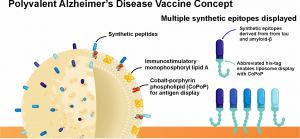POP BIO announces findings for an Alzheimer’s Disease polyvalent peptide immunotherapy
POP BIO announces publication of “A pentavalent peptide vaccine elicits Aβ and tau antibodies with prophylactic activity in an Alzheimer’s disease mouse model”
The results of this ongoing collaboration show the great potential of the SNAP technology as a basis for the treatment of Alzheimer’s Disease. We are incredibly enthusiastic about our collaborations.”
BUFFALO, NY, UNITED STATES, September 10, 2024 /EINPresswire.com/ -- POP Biotechnologies (POP BIO), a Buffalo, NY-based biopharmaceutical company, is pleased to announce the publication of positive findings in a peer-reviewed paper entitled “A pentavalent peptide vaccine elicits Aβ and tau antibodies with prophylactic activity in an Alzheimer’s disease mouse model” in the journal Brain Behavior and Immunity, issue 122, 2024. — Jonathan Lovell
This work, in collaboration between POP Biotechnologies (Buffalo, NY), State University of New York at Buffalo (Buffalo, NY), the New York State Institute for Basic Research in Development Disabilities (Staten Island, NY), McGill University (Montreal, QC), Tokyo Metropolitan Geriatric Hospital and Institute of Gerontology (Tokyo, JP), and Hanyang University Guri Hospital (Hanyang University Guri Hospital, KR), provides positive evidence of the potential of spontaneous nanoliposome antigen particle (POP BIO’s SNAP™) technology as a basis for the treatment of Alzheimer’s Disease (AD).
Amyloid-β (Aβ) and hyperphosphorylated tau (tau) protein are targets for AD immunotherapy, which are generally focused on single epitopes within Aβ or tau. However, due to the complexity of both Aβ and tau in AD pathogenesis, a multipronged approach simultaneously targeting multiple epitopes of both proteins has the potential to overcome limitations of monotherapies.
In this publication, an active AD immunotherapy based on a nanoparticle vaccine comprising two Aβ peptides (1–14 and pyroglutamate pE3-14) and three tau peptides (centered on phosphorylated pT181, pT217 and pS396/404) is evaluated. These correspond to both soluble and aggregated targets and are displayed on the surface of immunogenic liposomes in an orientation that maintains reactivity with epitope-specific monoclonal antibodies.
Intramuscular immunization of mice with individual epitopes resulted in minimally cross-reactive antibody induction, while simultaneous co-display of multiple antigens induced antibodies against all epitopes without immune interference. Post-immune sera recognized plaques and neurofibrillary tangles from human AD brain tissue.
Vaccine administration to 3xTg-AD mice using a prophylactic dosing schedule inhibited tau and amyloid pathologies and resulted in improved cognitive function. Immunization was well tolerated and did not induce antigen-specific cellular responses or persistent inflammatory responses in the peripheral or central nervous system. Antibody levels could be reversed by halting monthly vaccinations. Altogether, these results indicate that active immune therapies based on nanoparticle formulations of multiple Aβ and tau epitopes warrant further study for treating early-stage AD.
“The results of this ongoing collaboration show the great potential of the SNAP technology as a basis for the treatment of Alzheimer’s Disease. We are incredibly enthusiastic about our ongoing collaborations and see great potential in this approach.” said POP BIO co-founder Jonathan Lovell.
The experiment polyvalent Alzheimer’s Disease peptide vaccine (termed PADIVAX™) is currently being advanced towards clinical trials by EuPOP Life Sciences, a Buffalo NY based joint venture formed between POP BIO and South Korean vaccine maker EuBiologics.
About POP Biotechnologies: POP Biotechnologies, Inc. is a privately held biotechnology company focused on the research and development of novel therapeutics and vaccines employing their proprietary porphyrin-phospholipid (PoP) liposome technologies. The PoP technology, exclusively licensed from the State University of New York Research Foundation (SUNY-RF), was developed by company co-founder Dr. Jonathan Lovell at his academic facilities at The State University of New York at Buffalo (SUNY Buffalo). POP Biotechnologies is currently a resident of the SUNY Buffalo incubator at Baird Research Park.
About POP BIO’s SNAP Technology: POP BIO’s Spontaneous Nanoliposome Antigen Particleization (SNAP) technology enables the rapid development and manufacturing of highly immunogenic particle-based vaccines and immunotherapies directed against infectious disease and cancer through the use of a cobalt modified variant of the PoP technology (CoPoP).
POP BIO’s SNAP™ technology enables rapid and seamless generation of stable particle-formation and liposome-display of protein and peptide antigens resulting in substantial improvements in immune responses.
About EuBiologics: EuBiologics is a South Korean Biotechnology company that is advancing the EuHZV vaccine and other vaccine products. EuBiologics has 2 main animal-based bioreactors (1,000L) to produce recombinant protein antigens at Chuncheon Plant 1(C-Plant) and EcML(Monophosphoryl Lipid A) which is adjuvant at Chuncheon Plant 2(V-Plant). The total capacity of Eubiologics facilities is currently in the hundreds of millions of doses per year.
About EuPoP: EuPoP is a joint venture between POP BIO and EuBiologics based in Buffalo, NY leveraging platform technologies from POP BIO and EuBiologics.
Jonathan R Smyth
POP Biotechnologies, Inc.
+1 315-220-0087
email us here
Legal Disclaimer:
EIN Presswire provides this news content "as is" without warranty of any kind. We do not accept any responsibility or liability for the accuracy, content, images, videos, licenses, completeness, legality, or reliability of the information contained in this article. If you have any complaints or copyright issues related to this article, kindly contact the author above.

